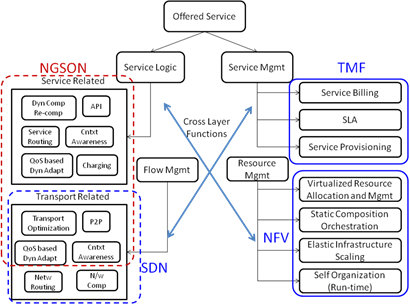IEEE SDN/NFV Standardization
Niranth Amogh, Huawei; Alex Gelman, Director - IEEE ComSoc Standards Program Development Board; and Mehmet Ulema, Director - IEEE ComSoc Standards Development Board
1. Introduction
Software Defined Networking (SDN) and Network Functions Virtualization (NFV) are being increasingly applied to a variety of communication networks including mobile and computer networks. The key characteristics of SDN and NFV are modularization of hardware and software, virtualization at all levels of network, multi-tenancy via supporting multi user control of resource and provision of strong isolation of control, and centralization of control and programmability.
A key question remains - How does software defined and virtualized networks provide a paradigm shift in the way application and services are designed and interact with these networks? There is a need to evaluate impact on end users, network and service providers.
There are a number of technical aspects which impact several network elements concerning SDN and NFV. Several key areas need to be addressed for standardization in order to accelerate the adoption of networks evolving with SDN and NFV. Several standardization bodies like ETSI, IETF, ONF, 3GPP, and IEEE itself are involved in standardizing different technical aspects.
This paper introduces the projects of IEEE Standards Association towards standardizing key issues surrounding SDN and NFV.
2. IEEE Standardization Efforts
2.1 Standard for Service Overlay Networks
“Next Generation Service Overlay Networks (NGSON)” is an effort to standardize a service ecosystem for the benefit of network operators, service and content providers, and end users. Protocols are being developed for service composition [1], content delivery [2] and self-organizing management [3].
A reference framework of IP-based service overlay networks for collaborative and customer-centric service delivery has already been standardized [4]. It includes context aware, dynamically adaptive, and self-organizing network capabilities such as advanced routing and forwarding schemes.
The below figure provides an illustration of an offered service model of NGSON.
Figure 1: NGSON offered service
NGSON also aims to accelerate the proliferation of SDN services and applications and to offer a more efficient way of providing them through a service architecture ecosystem of one-stop shopping for service specific challenges.
2.2 Standards for SDN/NFV Security, Performance and Reliability
It is well known that lack of quality modeling (security, performance, reliability) increases Capital Expenses (CAPEX) as well as Operational Expenses (OPEX) of the networks. There are several motivations from the perspective of quality which require standards development such as security and performance degradation for services delivered over SDN/NFV, creation of outage database, identification of level of resilience/service quality, identification of Key Performance Indicators (KPIs), cross layer optimizations, reliability models/schemes, Quality of Service (QoS) and impact of Service Level Agreements (SLAs), Quality of Experience (QoE), language for service reliability and mapping to SDN/NFV KPIs.
“Security for Virtualized Environments” [5] is an effort to standardize security models, terminology, and analytics, essential components of SDN/NFV environments to ensure confidentiality, integrity and availability.
“Performance for Virtualized Environments” [6] is an effort to standardize performance models, terminology, and analytics to enable optimized system operations and service delivery in SDN/NFV infrastructures.
“Reliability for Virtualized Environments” [7] is an effort to standardize reliability models, terminology, and analytics to enable optimized system operations and service delivery in SDN/NFV infrastructures.
2.3 Software-Defined Quantum Communication
The purpose of this project is to define a classical interface to quantum communication devices that permits these devices to be reconfigured to implement a variety of protocols and measurements [8]. This interface will enable configuration of quantum endpoints in a communication network in order to dynamically create, modify, or remove quantum protocols or applications. The protocol design will facilitate future integration with Software-Defined Networking and Open Networking Foundation OpenFlow.
3. References
[1] P1903.1 - Standard for Content Delivery Protocols of Next Generation Service Overlay Network (NGSON), https://standards.ieee.org/develop/project/1903.1.html
[2] P1903.2 - Standard for Service Composition Protocols of Next Generation Service Overlay Network (NGSON), https://standards.ieee.org/develop/project/1903.2.html
[3] P1903.3 - Standard for Self-Organizing Management Protocols of Next Generation Service Overlay Network (NGSON), https://standards.ieee.org/develop/project/1903.3.html
[4] 1903-2011 - IEEE Standard for the Functional Architecture of Next Generation Service Overlay Networks, http://standards.ieee.org/findstds/standard/1903-2011.html
[5] P1915.1 - Standard for Software Defined Networking and Network Function Virtualization Security, https://standards.ieee.org/develop/project/1915.1.html
[6] P1916.1 - Standard for Software Defined Networking and Network Function Virtualization Performance, https://standards.ieee.org/develop/project/1916.1.html
[7] P1917.1 - Standard for Software Defined Networking and Network Function Virtualization Reliability, https://standards.ieee.org/develop/project/1917.1.html
[8] P1913.1 - Standard for Software Defined Quantum Communication, https://standards.ieee.org/develop/project/1913.1.html
 Niranth Amogh (namogh@huawei.com) is a Principal Researcher at the Huawei India R&D Center at Bangalore. He is responsible for the Wireless Networks Research within the organization. His research areas include Broadband Critical Communications, M2M/IoT, SDN/NFV and NGSON. He has filed several patents in his research areas and holds leadership positions in several SDOs in India and globally. He is an alumnus of BITS, Pilani and NIE, Mysore.
Niranth Amogh (namogh@huawei.com) is a Principal Researcher at the Huawei India R&D Center at Bangalore. He is responsible for the Wireless Networks Research within the organization. His research areas include Broadband Critical Communications, M2M/IoT, SDN/NFV and NGSON. He has filed several patents in his research areas and holds leadership positions in several SDOs in India and globally. He is an alumnus of BITS, Pilani and NIE, Mysore.
 Alexander D. Gelman (gelman.alexander@gmail.com) is Chief Technical Officer of NETovations, LLC, Networking Research Consulting Group and Director of Standards Program Development in IEEE ComSoc. Previously, Alex worked with Panasonic Princeton Laboratory and Bellcore. Alex served on several ComSoc committees, in publications and conferences and co-founded CCNC. Alex founded the ComSoc Standards Board and initiated several IEEE standardization projects. Alex is 2006 winner of IEEE ComSoc´s Donald W. McLellan Meritorious Service Award. He received ME and Ph.D. (EE) from the City University of New York.
Alexander D. Gelman (gelman.alexander@gmail.com) is Chief Technical Officer of NETovations, LLC, Networking Research Consulting Group and Director of Standards Program Development in IEEE ComSoc. Previously, Alex worked with Panasonic Princeton Laboratory and Bellcore. Alex served on several ComSoc committees, in publications and conferences and co-founded CCNC. Alex founded the ComSoc Standards Board and initiated several IEEE standardization projects. Alex is 2006 winner of IEEE ComSoc´s Donald W. McLellan Meritorious Service Award. He received ME and Ph.D. (EE) from the City University of New York.
 Mehmet Ulema (mehmet.ulema@manhattan.edu) is a professor at the Computer Information Systems at Manhattan College, New York. Previously, he was with AT&T Bell Laboratories, Bellcore, Daewoo Telecom, and Hazeltine. He also serves as the Director of Standards Development in ComSoc. He was the TPC Chair of GLOBECOM 2009, General Co-chair of NOMS 2016. He is on the editorial board of IEEE Journal of IoT, and Springer Journal of Network and Services Management. He received PhD at Polytechnic University, Brooklyn and BS & MS at Istanbul Technical University.
Mehmet Ulema (mehmet.ulema@manhattan.edu) is a professor at the Computer Information Systems at Manhattan College, New York. Previously, he was with AT&T Bell Laboratories, Bellcore, Daewoo Telecom, and Hazeltine. He also serves as the Director of Standards Development in ComSoc. He was the TPC Chair of GLOBECOM 2009, General Co-chair of NOMS 2016. He is on the editorial board of IEEE Journal of IoT, and Springer Journal of Network and Services Management. He received PhD at Polytechnic University, Brooklyn and BS & MS at Istanbul Technical University.
Subscribe to IEEE Softwarization
Join our free SDN Technical Community and receive IEEE Softwarization.
Article Contributions Welcomed
Download IEEE Softwarization Editorial Guidelines for Authors (PDF, 122 KB)
If you wish to have an article considered for publication, please contact the Managing Editor at sdn-editor@ieee.org.
Past Issues
IEEE Softwarization Editorial Board
Laurent Ciavaglia, Editor-in-Chief
Mohamed Faten Zhani, Managing Editor
TBD, Deputy Managing Editor
Syed Hassan Ahmed
Dr. J. Amudhavel
Francesco Benedetto
Korhan Cengiz
Noel Crespi
Neil Davies
Eliezer Dekel
Eileen Healy
Chris Hrivnak
Atta ur Rehman Khan
Marie-Paule Odini
Shashikant Patil
Kostas Pentikousis
Luca Prete
Muhammad Maaz Rehan
Mubashir Rehmani
Stefano Salsano
Elio Salvadori
Nadir Shah
Alexandros Stavdas
Jose Verger




